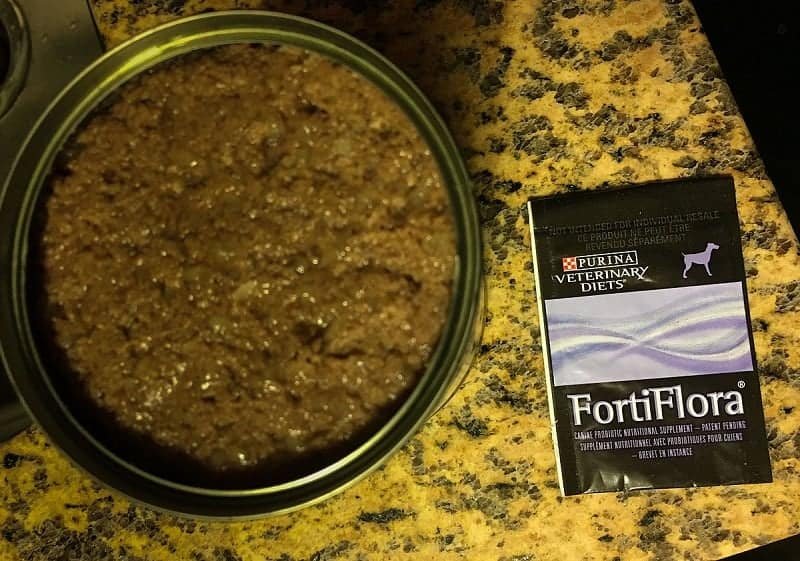Can Dogs Eat Probiotics For Humans? A Comprehensive Guide

Are you a devoted pet parent constantly seeking new ways to keep your furry friend healthy and happy? One promising approach to maintaining good gut health in humans is through the use of probiotics, but what about our beloved canine companions? Can dogs eat probiotics for humans, and more importantly, are they safe for them?
As it turns out, the answer is not as simple as a yes or no. While there are probiotics marketed for human consumption, there are also specialized probiotics designed specifically for dogs. In this blog post, we’ll delve into the potential benefits and risks of incorporating probiotics into your dog’s diet, and share expert insights to help you make an informed decision for your furry friend. So, let’s explore the question on every pet parent’s mind – can dogs eat probiotics?
What are Probiotics for Dogs and What Do They Do?
Probiotics are good bacteria that live in the gut and help to balance the digestive system of your dogs. These microorganisms can benefit your dog’s health when consumed in the right amounts.
Probiotics for dogs can come in various forms such as supplements, treats, or natural sources like yogurt or kefir. They contain beneficial bacteria that can help improve your dog’s gut health, boost their immune system, and prevent the overgrowth of harmful bacteria in the gut.
Can Dogs Eat Probiotics?
Yes, dogs can eat probiotics. Probiotics are beneficial to dogs and can improve their digestive health, boost their immune system, and prevent the overgrowth of harmful bacteria in the gut. It is crucial to give your dog the right amount of probiotics, and it is advisable to consult with your veterinarian before starting any probiotic regimen.
When giving probiotics to your dog, it is essential to follow the dosage and administration instructions provided by the manufacturer. The right dosage and administration will help ensure that your dog gets the maximum benefit from the probiotic.
Read this article next: Can Dogs Eat Nutritional Yeast? Yes!! See The Awesome Benefits

Can Dogs Eat Probiotics for Humans?
Yes, dogs can take human probiotics, but it is not always recommended. Probiotics made for humans are not specifically designed for dogs and may contain strains that can be harmful to them. Some human probiotics may also have higher levels of bacteria, which could upset a dog’s stomach.
It is best to choose a probiotic specifically formulated for dogs to avoid any potential risks. If you are unsure which probiotic to give your dog, consult with a veterinarian. They can help you choose the best option and give you guidance on how much to give your dog.
Benefits of Probiotics for Dogs
Probiotics offer several benefits to dogs, including improving their digestive health, boosting their immune system, reducing the risk of diarrhea and other gastrointestinal issues, improving their skin and coat health, and improving their dental health.
1. Improved Digestive Health: Probiotics help to maintain a healthy balance of good bacteria in the gut, which improves digestive health and helps to prevent gastrointestinal issues.
2. Boosted Immune System: Probiotics can help boost your dog’s immune system, making them less susceptible to infections and diseases.
3. Reduced Risk of Diarrhea: Probiotics can help prevent and treat diarrhea in dogs. They can help restore the balance of good bacteria in the gut, which can reduce the severity and duration of diarrhea.
4. Improved Skin and Coat Health: Probiotics can help improve your dog’s skin and coat health by reducing inflammation and promoting healthy skin.
5. Improved Dental Health: Probiotics can help improve your dog’s dental health by reducing plaque buildup and promoting healthy teeth and gums.
What Makes a Good Probiotic for Dogs?
When choosing the right probiotic for your dog, there are several factors to consider. One of the most important is the specific strains of bacteria in the product. A good probiotic should contain strains of bacteria that are known to be beneficial for dogs. For example, Lactobacillus acidophilus can be helpful for dogs with diarrhea, while Bifidobacterium bifidum can be helpful for dogs with allergies.
Another important factor is the colony-forming units (CFUs) in the product. CFUs refer to the number of live bacteria in the product, and the higher the CFUs, the more effective the product will be. You should also choose a probiotic that contains at least one billion colony-forming units (CFUs) per dose.
The product’s packaging is also essential to consider. Some probiotics require refrigeration, while others can be stored at room temperature. The type of packaging used can affect the potency of the probiotics.

Signs Your Dog Needs Probiotics
There are several signs that your dog may need probiotics. Some of the most common signs include diarrhea, constipation, gas, bloating, bad breath, and a weakened immune system.
If you notice any of these signs in your dog, it is essential to consult with your veterinarian before starting any probiotic regimen. Your veterinarian can help you determine the underlying cause of the symptoms and recommend the right probiotic for your dog.
Probiotics for puppies with diarrhea
If your puppy has diarrhea, you can give them probiotics to help their tummy feel better. First, ask your vet which probiotic is best for your puppy because some causes of diarrhea in puppies can be serious and require medical attention. Then, follow the instructions on the package for the correct dosage.
Probiotics can come in a powder or pill form, and you can mix the powder into your puppy’s food or give them the pill with a treat. It’s important to give the probiotics regularly and consistently to help your puppy’s tummy feel better. You should also make sure your puppy has plenty of clean water to drink and is eating a healthy, balanced diet. If your puppy’s diarrhea doesn’t improve or gets worse, be sure to contact your vet again for further advice.
Dog probiotics for yeast infection
A yeast infection in dogs is caused by an overgrowth of yeast in their body. Probiotics can help fight this infection by introducing healthy bacteria to the dog’s gut, which can balance the yeast population. Dog probiotics for yeast infection usually contain specific strains of bacteria that are known to fight yeast overgrowth. These strains include Lactobacillus acidophilus, Bifidobacterium bifidum, and Streptococcus thermophilus.
Probiotics can be given to dogs in different forms, such as powders, capsules, or treats. However, it is important to consult with a veterinarian before giving probiotics to a dog with a yeast infection. A veterinarian can recommend the right type of probiotic and the correct dosage to ensure the best possible outcome.
Dog probiotics for allergies
Dog probiotics for allergies can help improve the health of your dog’s gut bacteria, which in turn can reduce allergy symptoms. Allergies are often caused by an overactive immune system, and probiotics can help regulate this response. Probiotics can also improve your dog’s skin health, which is often affected by allergies.
By supplementing your dog’s diet with probiotics, you can help reduce allergy symptoms and improve their overall health. However, it’s important to choose the right probiotic for your dog’s specific needs and consult with a veterinarian before adding any supplements to their diet.
Risks of Giving Probiotics to Dogs
Probiotics can be beneficial for dogs, but they can also come with some risks. Here are some of the risks associated with giving probiotics to dogs:
1. Allergic Reactions: Just like humans, dogs can be allergic to certain substances. While probiotics are generally safe, some dogs may be allergic to the specific strains of bacteria found in the supplement.
2. Upset Stomach: When you first start giving your dog probiotics, they may experience digestive upset such as diarrhea, bloating, or gas. This is usually a temporary side effect, but if it persists, you should consult with your veterinarian.
3. Overgrowth of Harmful Bacteria: Giving your dog too many probiotics can cause an overgrowth of harmful bacteria in their digestive tract, which can lead to serious health issues.
4. Immune System Overreaction: In rare cases, probiotics can trigger an immune system overreaction that can cause inflammation throughout the body.
5. Interference with medication: Probiotics may interact with certain medications, so it’s essential to consult with a veterinarian before adding them to your dog’s diet.
6. Risks of giving probiotics to dogs with underlying health conditions: If your dog has an underlying health condition, such as a weakened immune system, in some cases, probiotics can actually make the condition worse.
It’s important to consult with your veterinarian before giving your dog probiotics to ensure that they are safe and appropriate for your dog’s specific needs. Additionally, it’s crucial to follow the dosage and administration instructions on the label carefully.
Frequently Asked Questions
Can probiotics make my dog’s poop firmer?
Yes, probiotics can help improve your dog’s digestion and may lead to firmer stools.
Can probiotics help with my dog’s bad breath?
It’s possible. Probiotics can help balance the bacteria in your dog’s gut, which may lead to fresher breath.
How long should I give my dog probiotics?
It depends on the reason you are giving your dog probiotics. Some dogs may benefit from long-term use, while others may only need it for a short period. Consult with your veterinarian to determine the appropriate duration for your dog.
Can probiotics help my dog’s immune system?
Yes, probiotics can help support your dog’s immune system by promoting a healthy gut microbiome.
Are there any risks associated with giving my dog probiotics?
While probiotics are generally safe, some dogs may experience gastrointestinal upset or allergic reactions. Always consult with your veterinarian before giving your dog any new supplement.
Conclusion
In conclusion, probiotics can be beneficial for dogs in many ways, such as improving digestion, strengthening the immune system, and preventing health issues. However, it is crucial to choose the right probiotics and give them in the appropriate dosage. Consultation with a veterinarian is always recommended, especially if your dog has underlying health conditions.
When it comes to choosing the right probiotics, look for the ones with specific strains that address your dog’s health issues. Also, consider the quality and reputation of the brand.
While probiotics can be helpful, they are not a substitute for a balanced diet and healthy lifestyle for your furry friend. As with any supplement, probiotics should be used in moderation and under the guidance of a professional.
In summary, probiotics can benefit your dog’s health when given properly. With careful consideration and guidance from a veterinarian, you can choose the right probiotics and keep your furry friend healthy and happy. So, the next time you ask yourself, “Can dogs eat probiotics?” The answer is yes but with caution and care.





